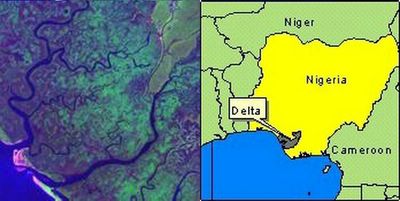
Nigeria
Town razed by army after feud
By Dave Clark in Odioma
March 22, 2005
Daily Telegraph
Niger Delta Women for Justice
A DEADLY chain of events triggered by the arrival of a team from the oil giant Shell surveying a site for a new well in the Niger Delta has so far resulted in 28 people killed and the town of Odioma burned down by government troops.
The visit reignited a dispute between the neighbouring communities of Obiaku and Odioma, the latest local conflict to erupt from southern Nigeria's poisonous cocktail of abject poverty, squalid politics, well-armed gangs and a multibillion-dollar oil and gas industry.
Thousands have fled Odioma, a sizeable port reachable only by boat through the delta's maze of estuarine creeks and mangrove swamp. The few left have buried 16 people, at least three of whom had bullet wounds, according to the local council of chiefs.
"There were none of these problems before the oil came. The companies and the government have given too much money and power to small boys," complained Daniel Orumiegha-Bari, the 68-year-old council head.
A joint unit of Nigerian soldiers, sailors and police descended on Odioma about 10.30am on February 19. Officially, they were hunting down a local militia leader and black magic guru who was accused of murdering 12 people from Obiaku.
Local leaders said militia chief Osei Clever had grown beyond the control of his community after being armed as a local enforcer by state government officials keen to keep control of the oil-rich creeks of the delta, and that Odioma was the victim of an unjust collective punishment.
"I'm looking for anything I can," mumbled a blank-eyed and expressionless Alabota Johnson, a 60-year-old grandmother, standing pointlessly amid the wreckage of her family home. "Everybody has fled. This is no place to stay."
Barely one of the mud-brick or concrete block homes in the town centre survived intact. Most now stand open to the heavy, slate-grey sky, their roof beams burnt away and the corrugated iron roofs shattered amid the debris below.
The heat was so intense that stacks of beer bottles melted and fused together in the waterfront market.
"I had three houses here. Two were burned down and the third only survived because my wife begged the soldiers on her knees," muttered one local elder, fearful to say more under the gaze of Odioma's new masters, an intelligence officer and a squad of rifle-toting soldiers in T-shirts and flip-flops.
Osei has gone on the run, leaving behind him the clearly marked speedboats donated to his gang by the government for the so-called Bayelsa Volunteers Anti-Piracy Squad.
According to the commander of the raid, Brigadier-General Elias Zamani, stray bullets hit jerry cans of fuel, triggering an accidental fire.
"As soon as our men entered Odioma, the gang opened fire and, of course, we fired back and, in the process, killed one of them. A number of houses were burned because the people stored petrol in their houses," he said.
Fearful local leaders will not openly dispute this, but the evidence on the ground points to deliberate destruction.
There are very few bullet holes in the walls of the remaining homes, while a vast area of the town centre has been systematically razed.
Tellingly, soldiers proudly show off the fetishes seized in the militia leader's home. Somehow, they were able to capture this evidence intact before "stray bullets" touched the fuel drums supposedly stored in this and perhaps 50 more buildings nearby.
"Normally what happens after a crime is an investigation. What baffles me now is that no investigation was made," said Orumiegha-Bari.
As he spoke, rifle shots rang out from the waterfront as soldiers fired warning rounds over passing river traffic.
The raid on Odioma followed an earlier massacre of 12 people from Obiaku - including a pregnant woman and four local councillors - in an ambush on a boat carrying them home after peace talks in the state capital.
Odioma and Obiaku - both ethnic Ijaw communities of canoe carvers, traders and occasional fishermen - dispute ownership of Owukubu, a riverside district where the Anglo-Dutch energy giant Shell hopes to site an oil well.
On January 22, a survey company contracted by Shell moved a houseboat and team of engineers to the area to examine the site. Youths linked to Osei's militia headed to the area to demand jobs and compensation from the companies.
Obiaku, which has had an agreement with Shell since 1998, objected to Odioma's attempt to muscle in and the Nembe local government was forced to deploy a well-armed police unit to keep the peace.
Shell spokesman Simon Buerk said the firm had signed a deal with Obiaku and a third community in 1998 and had been unaware that Odioma claimed the land. The surveyors were pulled out on January 29 pending a resolution of the crisis.
Inconclusive talks were held on February 2 between community elders in Yenagoa, under the auspices of the state government, local leaders said.
Local government officials said they thought a deal had been reached, but when the Obiaku delegation set off for home the next day they were pursued by a boatload of youths and sprayed with automatic fire.
AFP

1 comment:
Keep up the good work »
Post a Comment